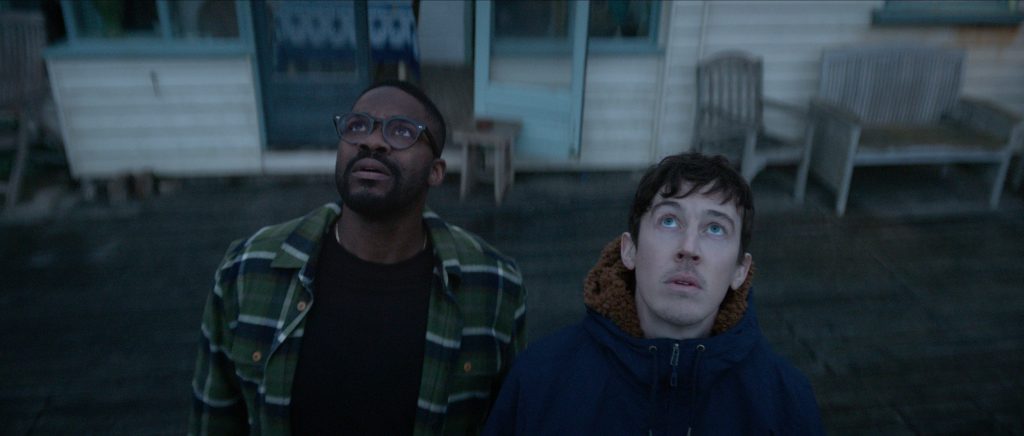When Netflix optioned celebrated novel The Three-Body Problem by Liu Cixin, the streamer no doubt hoped to bring a smash sci-fi epic to screen. They tapped David Benioff and D.B. Weiss (Game of Thrones) and Alexander Woo (True Blood) to lead the series, and clearly spent a good amount of money creating the episodes, which feature plenty of CGI and special effects.
Unfortunately for viewers, this commitment did not make 3 Body Problem the exciting, elevated drama it clearly wanted to be.
Described by Netflix as “an epic story that redefines sci-fi drama with its layered mysteries and genre-bending high stakes,” the series sees a young woman’s fateful decision in 1960s China reverberate across space and time into the present day. When the laws of nature inexplicably unravel before their eyes, a close-knit group of brilliant scientists join forces with an unorthodox detective to confront the greatest threat in humanity’s history.
Netflix wants to heavily restrict spoilers for 3 Body Problem, so I won’t be getting much into the plot of the series. Here is what I can tell you: early episodes significantly revolve around the shiny silver headsets you’ve seen in the trailers.
The headsets in question immerse the wearer in an intense virtual reality video game, unlike anything they’ve ever experienced before. Stepping into the game world is supposed to be a huge, revelatory experience for the characters. They’re experiencing a level of technology impossible in the current landscape. Beyond simply VR, they can feel the wind on their skin, smell the (virtual) people around them, taste the dirt they’re walking on.

It’s easy enough to understand how exciting that would be to experience in real life. But we’re watching someone describe the experience on a Netflix TV show, trapped behind our usual screen. So we don’t get that amazing, unique, revelatory experience. We’re usually just left looking at a few big, empty, soulless CGI landscapes — no different than any other show or movie with a big enough budget. So instead of blowing your mind, you just sort of shrug and think, “Yeah, okay. So what’s next?”
In a nutshell, that’s also how watching 3 Body Problem. The show clearly wants to come off as impressive, high-brow, immersive sci-fi. And yet, there’s this seemingly insurmountable disconnect between how exciting the show thinks it’s being and how you actually feel watching it.

For one thing, the show’s commitment to demonstrating the actual science in the basis for its sci-fi comes across as wildly inconsistent. “All of science is broken,” one character declares in the first episode, and does not elaborate. Later, we get an informative and detailed explanation of the titular “three body problem,” all real facts and hard science. Then, at the season’s climax, someone compares the big scientific solution they’ve developed the kind of “physics” ripped from a Fast and Furious movie. (Spoiler alert: they still follow through with the Vin Diesel plan.)
It’s not unusual for sci-fi to play fast and loose with real scientific principles. Arguably, it’s even expected for the genre. But 3 Body Problem always acts like it’s delivering “real,” grounded science, even when it’s poorly explaining or glossing over basic principles. It feels like it’s constantly trying so hard to be elevated and serious that it just starts to come across as a bit bland.
Perhaps the sci-fi snafus would fly under the radar more if the human element felt more compelling. But even here 3 Body Problem feels stretched too thin. The show essentially centers around five friends with scientific backgrounds. However, most of them seem to be around only to fulfill one specific purpose in the overall plot. So when it’s not time for their one big moment of relevancy, they’re just kind of… there.

One of the show’s only saving graces is its performances; overall, the acting felt strong, even when the characters seemed thin. I found Jess Hong (Jin), Rosalind Chao (Ye), Alex Sharp (Will), and Jonathan Pryce (Mike) particularly compelling.
It’s not quite right to call 3 Body Problem boring, because on paper a fair amount happens. In fact, a good deal of interesting sci-fi elements are woven into the series — no doubt evidence of just what made the original novel so compelling for readers. Every once in a while, I’d have a genuine “Oooh!” moment. But for a series that revolves around the theme of humanity, I just couldn’t get into a story where the characters so often felt disconnected from each other and the audience. I wish I could VR-headset my way into feeling this one.
3 Body Problem premieres on Netflix March 21.

![3 Body Problem: Netflix Sci-Fi Series Brings Big Ideas, But Fails To Make You Care About Them [Review]](https://thathashtagshow.com/wp-content/uploads/2024/03/project_20240318_1336385-01-1280x640.png)

![“The Owl House” Season 2: A Somewhat Rushed Dark Fantasy Yuri Masterpiece [Review]](https://thathashtagshow.com/wp-content/uploads/2022/11/313973867_533248825286068_5753552410369273347_n-1-440x264.jpg)
![Mother of the Bride is an adorable family rom-com! [REVIEW]](https://thathashtagshow.com/wp-content/uploads/2024/05/AAAABefIMEvxcv0RaLPm4M8Mcw6kUkOzVD2CggXyVxMFHIrbG1s_yyPQjFcPqGmRZx2yjRY-U5ogCGXQUmNX6I3hm1ogVCvpTpNZAiWH-440x264.jpg)
